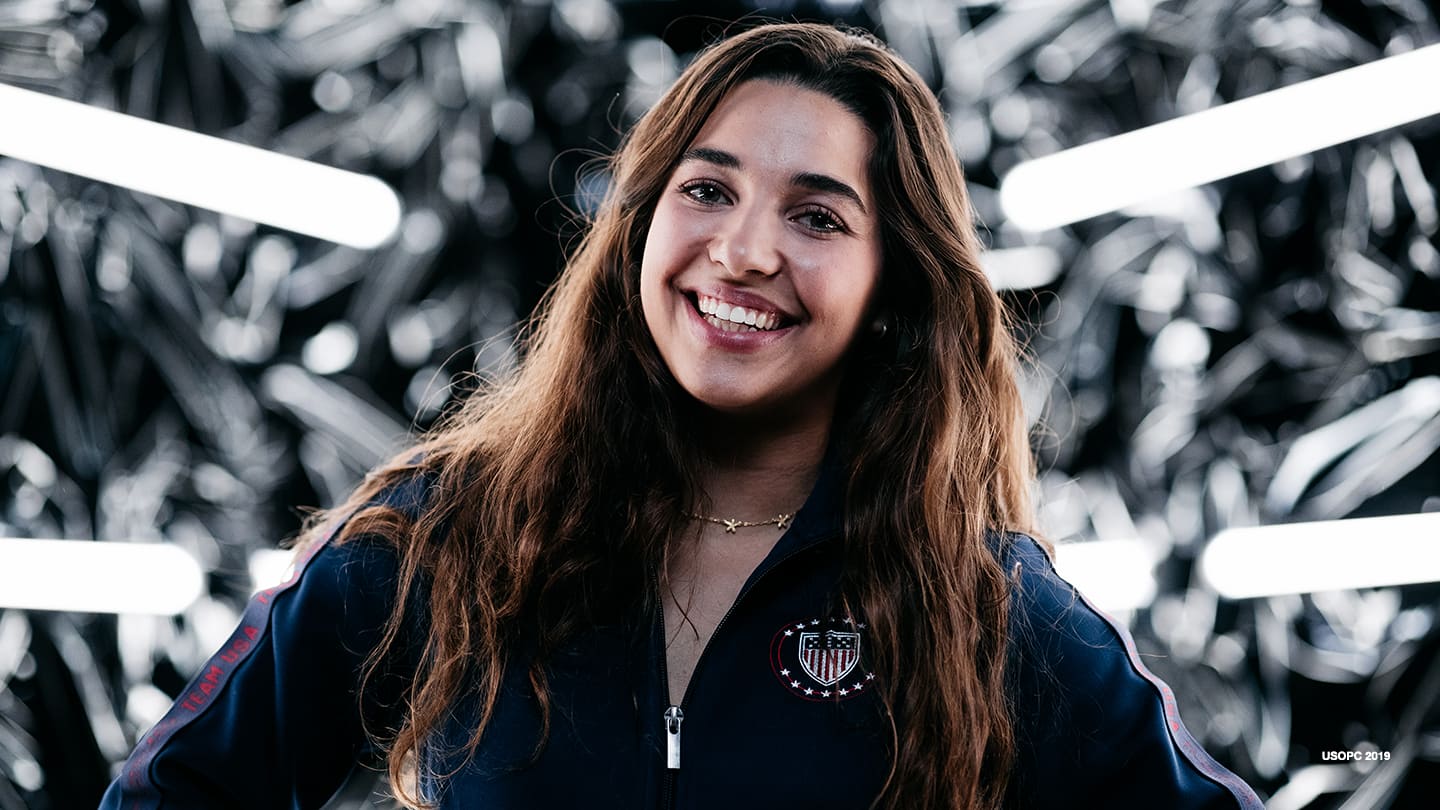
Brooke Raboutou Born To Make Climbing History At Olympic Games
Share:
by Karen Price

Brooke Raboutou poses at the Team USA Tokyo 2020 Olympic shoot on November 23, 2019 in West Hollywood, California.
Brooke Raboutou recently posted a highlight reel to her Instagram account of some of her favorite moves from two recent world cup climbing competitions in Salt Lake City, Utah.
Which one, she asks in the post, is your favorite?
That would be a tough choice for most people.
The average person looking at the walls Raboutou climbs would see just a few odd shapes with no discernible way for a human being to possibly get from the bottom to the top.
A world-class, soon-to-be Olympic sport climber such as Raboutou, however, sees a route. Instead of a triangle, a weird blob, half a circle and a sloping block, Raboutou sees a bodyweight shift to her right big toe, stretching as far as she can to get fingertips on the next handhold, putting her left toe where her right is and then a jump up. A few moves later and voila, the top.
Climbing, which will make its Olympic debut in Tokyo, is a sport like few others. Athletes have to be strong and not just in the biggest muscles but also in the smallest ones in their fingers and feet. They have to have endurance, flexibility, balance and the mental strength to go for a risky move high up off the ground with a crowd of people watching and the clock ticking down.
And Raboutou, 20, was pretty much born for it.
Her mother is four-time overall climbing world cup title winner Robyn Erbesfield-Raboutou and her father is Didier Raboutou, a French national climbing champion. Born and raised in the climbing hotspot of Boulder, Colorado, Raboutou started climbing when she was still in diapers. By nine she was setting records. At 11, she became the youngest person ever to climb a route with a difficulty rating of 5.14b, something that usually takes years of training and hard work.
She was the first U.S. climber to qualify for the Olympic Games.
“I think it’s taken a while to even realize what it means to be an Olympian let alone the first one in climbing for the U.S. and what that means history-wise,” she told TeamUSA.org last summer. “I think it’s really cool because my parents were at the top of their sport back when they were competing and if climbing was in the Olympics back then they likely would have been part of it. It’s cool that I can carry that on since they didn’t get a chance to.”
Sport climbing at the Games will be a combined event, meaning that climbers will be tested in three different disciplines and the medals will go to the athletes who do best over the entire competition.
In speed climbing, which is more popular in Europe than in North America, climbers race side-by-side up a wall on identical routes. Bouldering and lead climbing are much different. The dramatically more difficult and technical routes change at every competition, and the climbers only get a few minutes before the events begin to look at the routes and try to come up with a plan to get to the finish. Most of the time they’re figuring it out as they go along, but there is a time limit and muscle fatigue to consider so they have to keep moving.
The routes in bouldering are lower to the ground so they don’t use ropes. If they fall off, climbers can start over as many times as they like until the clock ticks down. In lead climbing, they tackle tall, often overhanging walls and must clip their ropes in as they go, adding another element of difficulty. Fall, and the climb is over.
“(Bouldering and lead climbing) are always changing, and I don’t think people realize we haven’t climbed those climbs before,” Raboutou said. “At the Olympics, the audience is going to be seeing those climbs before we do. So much comes with climbing, especially in the combined format. There are so many things you have to think about because it’s problem-solving, obviously strength, technique, and the mental game is a huge part of any sport but especially climbing. Especially when it’s not going well, and you have to try to think of a different way to get up the wall.”
There have only been a handful of international competitions this year, but Raboutou has finished in the top three in three of them. In the two back-to-back bouldering competitions in Salt Lake City, she finished third both times. The only lead climbing competition of the year so far was held in Innsbruck, Austria, at the end of June and Raboutou ended up making her first-ever final and finished second only to multiple-time world champion Janja Garnbret of Slovenia.
Next stop: Tokyo.
Karen Price is a reporter from Pittsburgh who has covered Olympic and Paralympic sports for various publications. She is a freelance contributor to TeamUSA.org on behalf of Red Line Editorial, Inc.